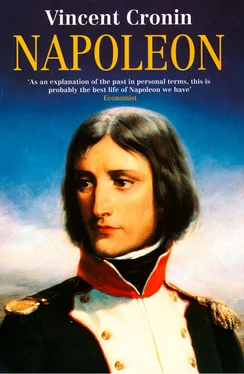Napoleon could very well have nodded silent approval to the Constitution and left it at that. As an artillery officer, he had his daily duties to perform. But in his essay on Happiness he had stated the obligation to become involved, to act on behalf of his fellow men. The Constitution was under attack from the nobles and clergy; from the kings of Europe; Napoleon decided to act in its defence.
He did so with great energy. He was one of the first to join the Society of Friends of the Constitution, a group of 200 Valence patriots, and he became secretary. On 3 July 1791 he played a leading part in a ceremony at which twenty-three popular societies of Isère, Drôme and Ardèche solemnly condemned the King’s attempted flight to Belgium. Three days later he swore the oath demanded of all officers, ‘to die rather than allow a foreign power to invade French soil’. On 14 July he swore an oath of loyalty to the new Constitution and, at a banquet the same evening, proposed a toast to the patriots of Auxonne.
Property began to be confiscated from the clergy and nobility and put up for sale by the Government under the name of biens nationaux. At first people were frightened to buy, fearing a counter-Revolution. Finally, in the dèpartment of the Drôme a man plucked up courage, put down money and made a purchase. Napoleon again stepped forward and publicly congratulated the buyer for his ‘patriotism’.
The Assembly had passed a decree known as the Civil Constitution of the Clergy, which declared the French clergy independent of Rome and that future clergy and bishops must be elected by their congregations. This decree was denounced by Pius VI. Napoleon promptly bought a copy of Duvernet’s anti-clerical History of the Sorbonne , studied the question of papal authority and noted down those occasions when French churchmen dared to say that a Pope was above the King. Napoleon thought Pius a meddler, but not everyone in Valence agreed. So Napoleon arranged for a priest named Didier, formerly a Recollect friar, to address his Society of Friends of the Constitution, where, amid applause, the priest assured the audience that clergy like himself who swore the oath of loyalty to the Civil Constitution acted in good faith, whatever Rome might say.
That was Napoleon’s position in the summer of 1791. The officer of noble birth, great-nephew of Archdeacon Lucciano, was taking a lead in the sale of property confiscated from the nobles and clergy. He was rallying support to a Constitution which stripped sovereignty from the King who had paid for his education and signed his commission. But these were the by-products of an essentially positive course of action. Napoleon, at twenty-one, was a contented man, burning with enthusiasm for a popular movement which embodied many of his aspirations, a movement which, he believed, was bringing justice to France, an end to oppression, and possibly also benefits to Corsica.
Конец ознакомительного фрагмента.
Текст предоставлен ООО «ЛитРес».
Прочитайте эту книгу целиком, купив полную легальную версию на ЛитРес.
Безопасно оплатить книгу можно банковской картой Visa, MasterCard, Maestro, со счета мобильного телефона, с платежного терминала, в салоне МТС или Связной, через PayPal, WebMoney, Яндекс.Деньги, QIWI Кошелек, бонусными картами или другим удобным Вам способом.












